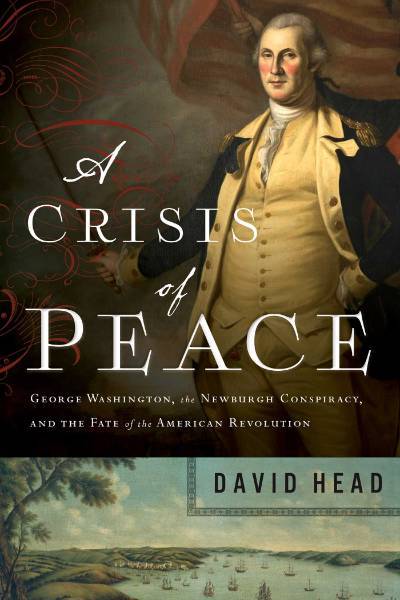Seven Finalists Named for George Washington Prize
Washington College’s Starr Center for the Study of the American Experience has announced the finalists for the 2020 George Washington Prize.

Seven books by leading historians of the nation's founding era have been nominated for the $50,000 annual award. The Prize recognizes the past year's best works on early American history, especially those that have the potential to advance broad public understanding of our shared past.
“At this moment in our history, examining the period of our nation's founding can yield fresh and powerful insights into our own time,” said Adam Goodheart, the Starr Center's Hodson Trust-Griswold Director. “These seven books span the best and worst of that era: from victories against tyranny to crimes against humanity.”
Created in 2005 by the Gilder Lehrman Institute of American History, George Washington's Mount Vernon, and Washington College's Starr Center, the George Washington Prize is one of the nation's largest literary awards. Past winners have included Ron Chernow, Lin-Manuel Miranda, Annette Gordon-Reed, and Nathaniel Philbrick.
The finalists were selected by a jury of distinguished historians. The winner will be announced this fall.
Written to engage a wide public audience, the selected books provide a go-to reading list for anyone interested in learning more about the founding period of the United States.
The Books in Brief
The British Are Coming: The War for America, Lexington to Princeton, 1775-1777
Rick Atkinson tells a story from the British perspective, making the mortal conflict between the redcoats and the rebels all the more compelling. He writes a gripping saga alive with astonishing characters: Henry Knox, the former bookseller with an uncanny understanding of artillery; Nathanael Greene, the blue-eyed bumpkin who becomes a brilliant battle captain; Benjamin Franklin, the self-made man who proves to be the wiliest of diplomats; George Washington, the commander in chief who learns the difficult art of leadership when the war seems all but lost.
Stolen: Five Free Boys Stolen into Slavery and Their Astonishing Odyssey
In this impeccably researched and breathlessly paced book, Richard Bell tells the incredible story of five boys whose courage forever changed the fight against slavery in America. Philadelphia, 1825: five young, free black boys fall into the clutches of the most fearsome gang of kidnappers and slavers in the United States. Lured onto a small ship with the promise of food and pay, they are instead met with blindfolds, ropes, and knives. Over four long months, their kidnappers drive them overland into the Cotton Kingdom to be sold as slaves. Determined to resist, the boys form a tight brotherhood as they struggle to free themselves and find their way home.
The Property of the Nation: George Washington's Tomb, Mount Vernon, and the Memory of the First President
Matthew Costello tells how the memory of George Washington was a deliberately constructed image, shaped and reshaped over time. He traces this process through the story of Washington's tomb. Its history and popularity reflect the building of a memory of America's first president—of, by, and for the American people. Shifting our attention from official days of commemoration and publicly orchestrated events to spontaneous visits by citizens, Costello's book clearly demonstrates in compelling detail how the memory of George Washington slowly but surely became The Property of the Nation.
Heirs of an Honored Name: The Decline of the Adams Family and the Rise of Modern America
Douglas Edgerton writes an absorbing story of brilliant siblings and family strain. John and Abigail Adams founded a famous political family, but they would not witness its calamitous fall from grace. When John Quincy Adams died in 1848, the slow decline of the family's political legacy began. Heirs of an Honored Name shows how the burden of impossible expectations shaped the Adamses and, through them, American history.
World of Trouble: A Philadelphia Quaker Family's Journey through the American Revolution
Richard Godbeer presents a richly layered and intimate account of the American Revolution as experienced by a Philadelphia Quaker couple, Elizabeth Drinker and the merchant Henry Drinker, who barely survived the unique perils that Quakers faced during that conflict. Spanning a half‑century before, during, and after the war, this gripping narrative illuminates the Revolution's darker side as patriots vilified, threatened, and in some cases killed pacifist Quakers as alleged enemies of the revolutionary cause. Amid chaos and danger, the Drinkers tried as best they could to keep their family and faith intact.
A Crisis of Peace: George Washington, the Newburgh Conspiracy, and the Fate of the American Revolution
David Head recounts the drama of George Washington's first crisis of the fledgling republic. He pens the story of a pivotal episode of George Washington's leadership and reveals how the American Revolution really ended: with fiscal turmoil, out-of-control conspiracy thinking, and suspicions between soldiers and civilians so strong that peace almost failed to bring true independence.
The Widow Washington: The Life of Mary Washington (Farrar, Straus and Giroux)
Martha Saxton unearths an insightful story of Mary Ball Washington, the mother of our nation's father, using archival sources. Her son's biographers have, for the most part, painted her as self-centered and crude, a trial and an obstacle to her eldest child. But the records tell a very different story. The Widow Washington is a necessary and deeply insightful corrective, telling the story of Mary's long, arduous life on its own terms, and not treating her as her son's satellite.






